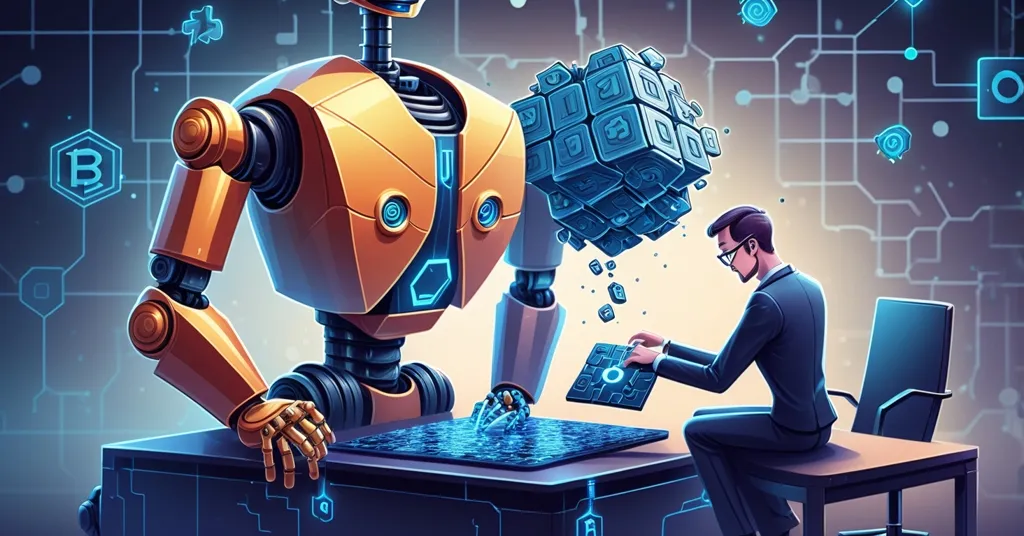AI Won’t Replace Crypto Developers Soon, Experts Say: A Collaborative Future Awaits

AI Won’t Replace Crypto Developers Anytime Soon, Say Industry Experts
Industry experts assert that AI won’t be replacing crypto developers anytime soon. Despite AI’s rapid growth and integration into the cryptocurrency sector, the complexity and specialized nature of blockchain technology mean that AI’s capabilities, while impressive, are still limited in the nuanced world of crypto development.
- AI’s growth in crypto is undeniable, but it won’t replace developers.
- AI enhances productivity, shifting developers to strategic roles.
- Challenges include maintaining decentralization and combating bias.
- The future sees AI and human developers in a collaborative partnership.
The Rise of AI in Crypto
The global AI market is projected to grow from $214.6 billion in 2024 to a staggering $1,339.1 billion by 2030, with a compound annual growth rate of 35.7%. This growth is mirrored in the crypto sector, where AI agents are increasingly used for trading, executing smart contracts (self-executing contracts with the terms directly written into code), and managing decentralized autonomous organizations (self-governing organizations run by code). The market capitalization of AI agents in crypto currently exceeds $13.5 billion, showcasing the sector’s significant investment in AI technology.
AI’s Limitations in Crypto Development
However, the emergence of highly advanced AI systems with greater autonomy hasn’t changed the consensus among experts. Manthan Dave, co-founder of Palisade, a digital asset custodian, puts it bluntly:
AI is getting insanely good at building standard web applications… But try asking an AI to help with a cross-chain bridge implementation (a system that allows different blockchains to communicate) or a complex staking contract (a contract that allows users to lock up their crypto to support the network), and you’ll quickly find yourself in endless cyclic arguments or hallucination territory.
This highlights the gap between AI’s current capabilities and the intricate demands of crypto development.
AI as a Tool for Developers
Dr. Alastair Moore, founding partner at The Building Blocks and an AI professor at University College London, sees AI as a tool that can enhance developer productivity:
Developers who effectively leverage AI tools will have significant advantages in efficiency, security, and innovation, reshaping the landscape into one where AI amplifies human creativity rather than replacing it entirely.
Tools like GitHub Copilot and ChatGPT are already making waves, automating tasks and improving productivity by generating Solidity code (a programming language for smart contracts) and explaining Web3 APIs (interfaces for interacting with blockchain applications).
The Human Element in Crypto Development
Andrew Hill, co-founder and CEO of Recall Network, a decentralized intelligence network for AI agents, echoes this sentiment:
AI is a tool that multiplies a developer’s intelligence. Crypto development isn’t just code – it’s protocol design, incentives, governance. These are human problems, best tackled by augmented humans, not black-box models.
This perspective shows how AI and humans can work together, where AI acts as a force multiplier rather than a replacement.
Challenges of Integrating AI into Crypto
Yet, the integration of AI into crypto isn’t without its challenges. Matej Janež, head of partnerships at Oasis Protocol, a blockchain platform, points out the trade-offs between rapid development and maintaining decentralization:
The first iterations of crypto and AI projects are pushing forward with novel use cases. However, with fast development, they’re also making compromises on the decentralization side of things.
This is a critical concern for a sector that prides itself on decentralization and autonomy.
Zac Cheah, co-founder of Pundi AI, a company developing AI solutions, addresses another challenge: bias in AI models:
Decentralized approaches can also help mitigate bias… Distributing data collection and labeling across a broader, more diverse group, helps create more balanced AI models.
This approach could be key to ensuring that AI in crypto remains fair and unbiased.
Kony Kwong, CEO and co-founder of GAIB, a company focused on AI in blockchain, highlights the need for specialized AI models:
The unique nature of blockchain technology requires specialized AI models that are currently in their infancy.
This underscores the ongoing need for development in AI to better serve the crypto sector’s unique needs.
The Future of AI and Crypto Development
Despite these challenges, the future of AI in crypto is seen as a collaborative partnership. AI-powered auditors like ChainGPT are already scanning smart contracts for vulnerabilities, enhancing security and efficiency. The consensus among experts is that AI will continue to augment, rather than replace, human developers, shifting their roles towards higher-level oversight and creative architecture.
Key Questions and Takeaways
- Will AI replace crypto developers in the near future?
No, industry experts believe that AI won’t replace crypto developers anytime soon due to the complexity and specialized nature of blockchain projects.
- How is AI currently being used in the crypto sector?
AI agents are used for trading, executing smart contracts, and managing decentralized autonomous organizations (DAOs).
- What are the challenges associated with AI in the crypto sector?
Challenges include maintaining decentralization, combating bias in AI models, and the lack of specialized AI models for crypto code analysis.
- How can AI help crypto developers advance?
AI can automate time-consuming tasks, improve productivity, and shift developers’ roles towards higher-level oversight and creative architecture.
- What is the future relationship between AI and crypto developers?
The future is seen as a collaborative partnership where AI amplifies human creativity and efficiency, rather than replacing developers.
In the world of crypto, where decentralization, privacy, and innovation are king, AI is poised to be a powerful ally. While it won’t replace the human touch anytime soon, it’s clear that AI will play a crucial role in shaping the future of blockchain technology. As we navigate this exciting landscape, the synergy between AI and human ingenuity promises to drive the next wave of financial revolution.



